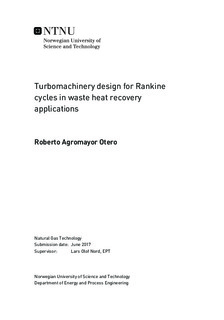Turbomachinery design for Rankine cycles in waste heat recovery applications
Master thesis
Permanent lenke
http://hdl.handle.net/11250/2454895Utgivelsesdato
2017Metadata
Vis full innførselSamlinger
Sammendrag
Rankine Cycles are an effective and efficient manner to convert waste thermal energy into power. Numerous fluids can be used in Rankine cycles, including water, hydrocarbons, hydrofluorocarbons, siloxanes, alcohols or even mixtures of fluids. The performance of Rankine cycles is highly dependent on the optimization of the operating conditions and the design of its components. The expander is, perhaps, the most important component of the Rankine cycle, as it is the device where the energy of the working fluid is converted into mechanical work. There are several expander technologies available, including axial, radial, and hybrid turbines, as well as positive displacement machines. The performance of Rankine cycles is greatly influenced by the efficiency of the expander and, as a result, the optimization of the expander is one of the critical tasks for the design of Rankine cycles.
This work is focused on simple and recuperated Rankine cycles using axial turbines. A waste heat recovery case study was proposed, where the heat source is a 10 kg/s mass flow rate of hot air at 250 oC (with a low temperature limit of 100 oC) and the heat sink is liquid water at 10 oC. 80 pure substances from the REFPROP library were considered as possible working fluids and a screening methodology was developed for the selection of the working fluid. In addition, methodologies for the optimization of simple and recuperated Rankine cycles and axial turbines of any number of stages were developed and implemented in MATLAB.
These methodologies were applied to the case study to find optimal Rankine cycles and axial turbine designs in order to identify possible research challenges within Rankine cycles and turbomachinery for waste heat recovery applications. In particular, it was found that the low speed of sound poses a challenge for the turbine design and that the usual assumption of using axial repeating stages may lead to unfeasible designs for the cases where the volume ratio across the turbine is high.
